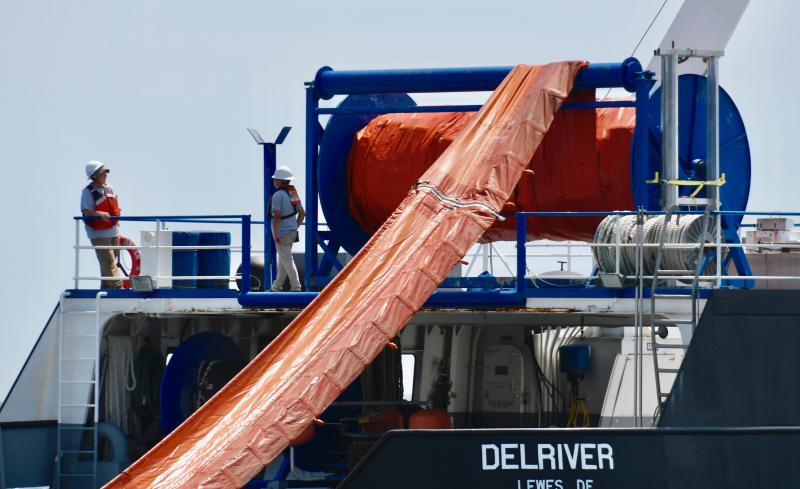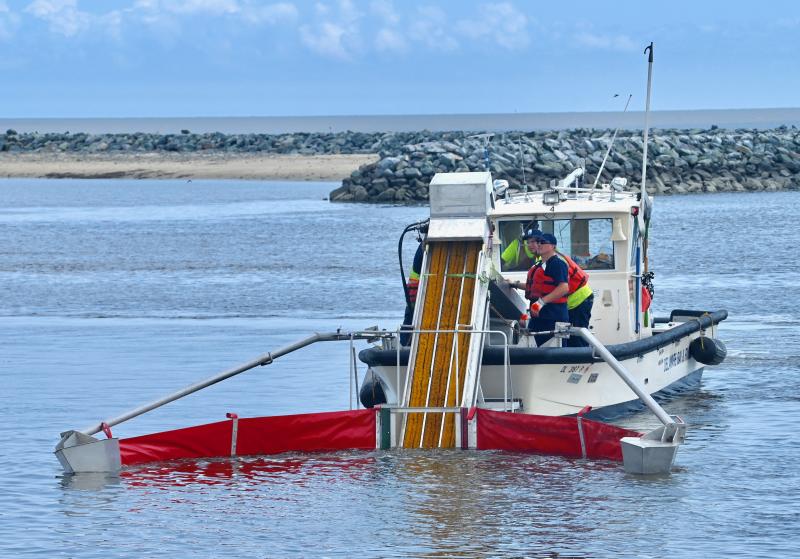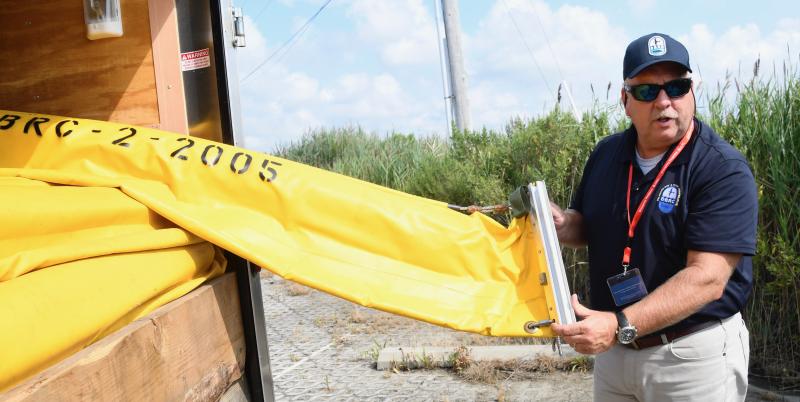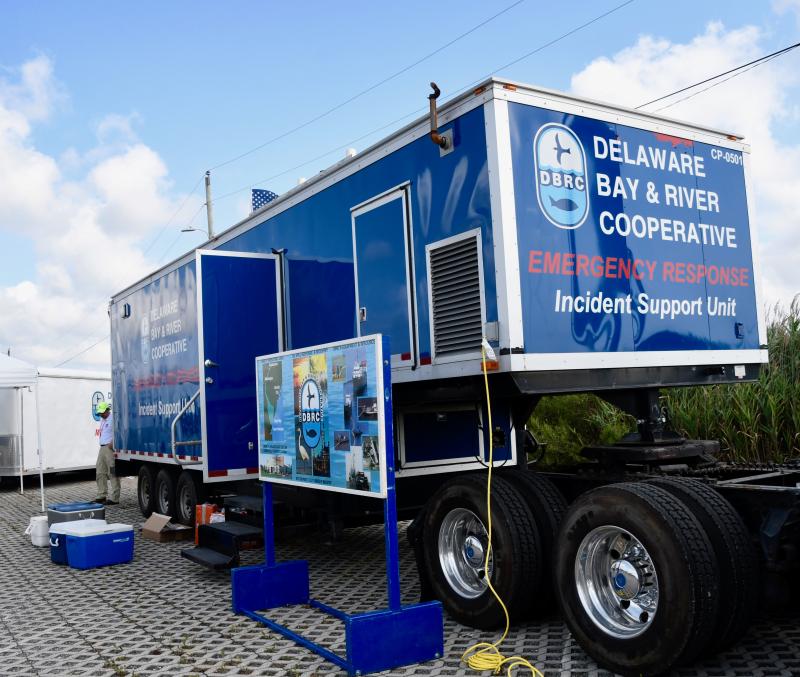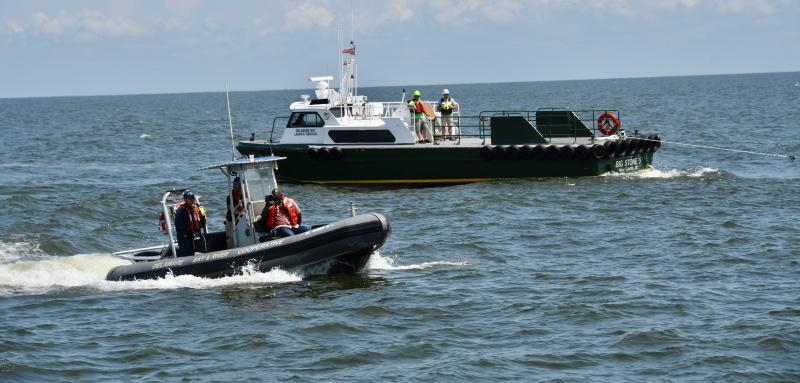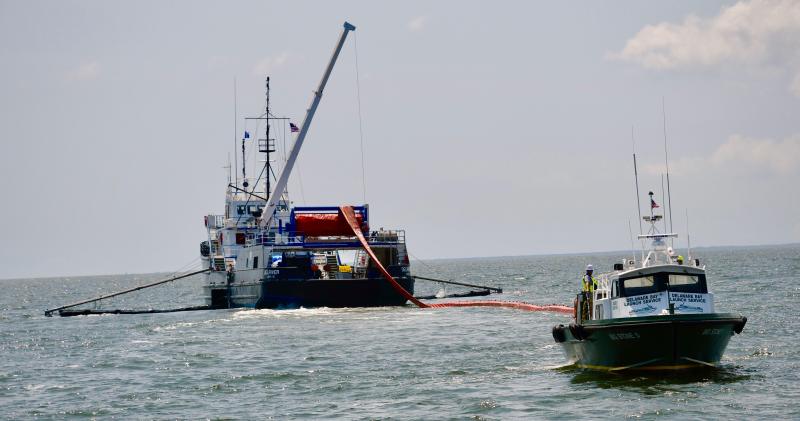DBRC and DelRiver participate in training exercise
The Delaware Bay and River Cooperative has to be trained and ready for an event its members hope never happens – a major oil spill on the bay or river.
DBRC participated in a multi-agency equipment exercise July 25 in the bay off Slaughter Beach in preparation for a larger U.S. Coast Guard exercise set for Wednesday, Aug. 9, in New Jersey. Taking part or observing the exercise with with DBRC were the Coast Guard, Delaware Bay Launch Service, several contractors, and state and federal officials including Sen. Russ Huxtable, D-Lewes, and representatives from Sen. Tom Carper’s and Sen. Chris Coons' offices.
The cooperative's mobile command center was set up in the staging area at the Cedar Creek boat ramp in Slaughter Beach. Two deployment sites were used – one in Cedar Creek and another in Delaware Bay north of Slaughter Beach – where crews practiced laying out booms.
In addition, the cooperative deployed several boats, including its oil-spill containment ship DelRiver, which usually is docked in Lewes at Roosevelt Inlet.
Invited guests, the media and officials were taken to the DelRiver deployment site by a Delaware Bay Launch Service boat, which is only one of several companies receiving training in oil-spill containment.
DelRiver is a converted offshore supply vessel put into service in 1990-91. The 425-ton, 166-foot ship has an onboard command center and a variety of skimming and boom equipment, including 3,200 feet of self-inflatable boom and 1,000 feet of inflatable deep-sea boom. The ship has a five-person crew on standby 24 hours a day.
The DelRiver has oil recovery capabilities of collecting 126,400 gallons, or more than 3,000 barrels.
The mission of the nonprofit organization is environmental preparedness, response and education. Its member company response teams receive training covering every aspect from using equipment to actual containment and recovery operations.
DBRC President Bob Poole said the cooperative has plans to replace the DelRiver with a new, faster, smaller ship in 2026.
“The cooperative is people working together to make a problem go away,” said DBRC board Chair Bill McEnroe. “A lot of companies are being more proactive.”
Co-op formed in 1977
The cooperative was formed in 1977 by members of the oil and transportation industries, including the large refineries in northern Delaware and the Philadelphia area.
Over the years, the cooperative and its contractors have established pre-planned boom deployment zones to protect environmentally sensitive areas. The sites are reviewed each year, Poole said, with each site identified as to location and how much boom would be needed. During the exercise, a cooperative crew laid out boom to protect Conch Bar and Grecos Canal north of Slaughter Beach.
One major spill
The industry got a rude wakeup call Nov. 26, 2004, when Athos 1, a single-hull, 750-foot oil tanker, struck a submerged 18,000-pound anchor and spilled more than 263,000 gallons of heavy crude oil in the busy Delaware Bay shipping channel. Oil washed up along 280 miles of shoreline in Delaware, Pennsylvania, New Jersey and Maryland. The spill caused an 11-day shutdown of the two Salem Nuclear Power Plant reactors in New Jersey when submerged oil was discovered near the site.
The shipping lane was closed for over a week, resulting in more than $162 million in paid claims to affected companies.
Because of the spill and its impact, several significant changes were put into place to address future oil spills along coastlines throughout the country.
DelRiver and other cooperative vessels assisted with the cleanup of the spill using its skimming capabilities.
Another spill occurred off the shore of Broadkill Beach in fall 2020. Crews cleaned up more than 75 tons of oily debris and tar balls along the shores from Bowers Beach to Ocean City, Md. Several beaches were closed during the cleanup process.
Poole said the number of oil spills has decreased dramatically due to development of double-hulled oil tankers, better technology and inspections. In addition, the number of oil tankers has decreased as companies are using train tanker cars to transport oil to refineries.
Monitoring lightering
Poole said the cooperative is constantly monitoring the tanker lightering operation in the bay at Big Stone Beach anchorage and can be deployed to the site in less than one hour. The anchorage is located midway between Bowers and Slaughter beaches. Because the shipping channel is too shallow, super tankers anchor off Big Stone Beach to pump off oil onto smaller tankers known as lighters. Once tankers have pumped off enough oil, they can proceed to Philadelphia-area refineries. The process can take as long as a week.
For more information, go to dbrcinc.org.
